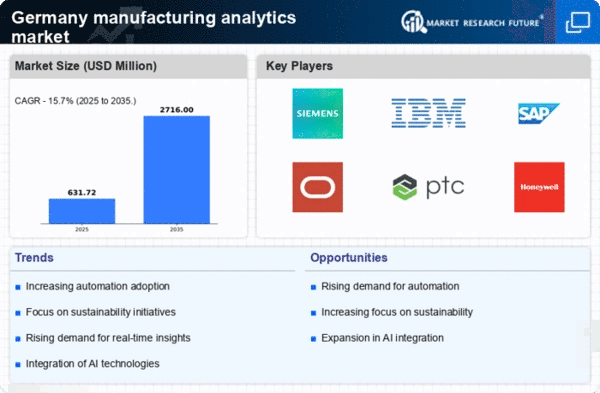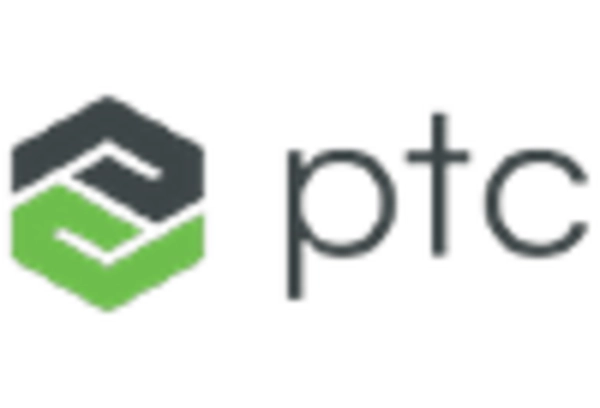Adoption of Industry 4.0 Technologies
The manufacturing analytics market is significantly influenced by the adoption of Industry 4.0 technologies in Germany. This paradigm shift towards smart manufacturing involves the integration of IoT, big data, and advanced analytics to create interconnected production environments. As manufacturers embrace these technologies, they are increasingly relying on analytics to derive actionable insights from the vast amounts of data generated. Reports indicate that the market for Industry 4.0 solutions is expected to grow at a CAGR of 15% over the next five years. This growth is likely to drive the demand for manufacturing analytics solutions, as companies seek to leverage data to enhance their operational capabilities and improve product quality.
Rising Demand for Operational Efficiency
The manufacturing analytics market in Germany is experiencing a notable surge in demand for operational efficiency. Companies are increasingly seeking ways to optimize their production processes, reduce waste, and enhance overall productivity. This trend is driven by the need to remain competitive in a rapidly evolving market. According to recent data, organizations that implement advanced analytics can achieve efficiency improvements of up to 20%. As a result, manufacturers are investing in analytics solutions that provide real-time insights into their operations, enabling them to make informed decisions. The focus on operational efficiency is likely to propel the growth of the manufacturing analytics market, as businesses recognize the value of data-driven strategies in achieving their goals.
Regulatory Compliance and Quality Control
In the context of the manufacturing analytics market, regulatory compliance and quality control are becoming paramount for German manufacturers. Stricter regulations and standards necessitate the implementation of robust analytics solutions to monitor and ensure compliance throughout the production process. Companies are increasingly utilizing analytics to track quality metrics, identify deviations, and implement corrective actions in real-time. This proactive approach not only mitigates risks associated with non-compliance but also enhances product quality. The market for quality management analytics is projected to grow by 12% annually, indicating a strong correlation between regulatory pressures and the adoption of analytics in manufacturing.
Growing Investment in Digital Transformation
The manufacturing analytics market is benefiting from the growing investment in digital transformation initiatives across Germany. As companies recognize the importance of digitalization in enhancing competitiveness, they are allocating substantial resources towards analytics solutions. This investment is aimed at harnessing data to drive innovation, streamline operations, and improve customer experiences. Recent statistics suggest that over 60% of manufacturers in Germany are prioritizing digital transformation, with analytics playing a crucial role in this journey. The influx of capital into digital initiatives is likely to bolster the manufacturing analytics market, as organizations seek to leverage data-driven insights to navigate the complexities of modern manufacturing.
Increased Focus on Supply Chain Optimization
The manufacturing analytics market is also witnessing an increased focus on supply chain optimization among German manufacturers. As global supply chains become more complex, companies are turning to analytics to enhance visibility and efficiency across their supply chains. By leveraging data analytics, manufacturers can identify bottlenecks, forecast demand, and optimize inventory levels. This strategic approach is expected to lead to cost savings and improved service levels. Market analysis indicates that the supply chain analytics segment is projected to grow by 10% annually, reflecting the critical role of analytics in driving supply chain efficiencies. This trend is likely to further stimulate the growth of the manufacturing analytics market.

















